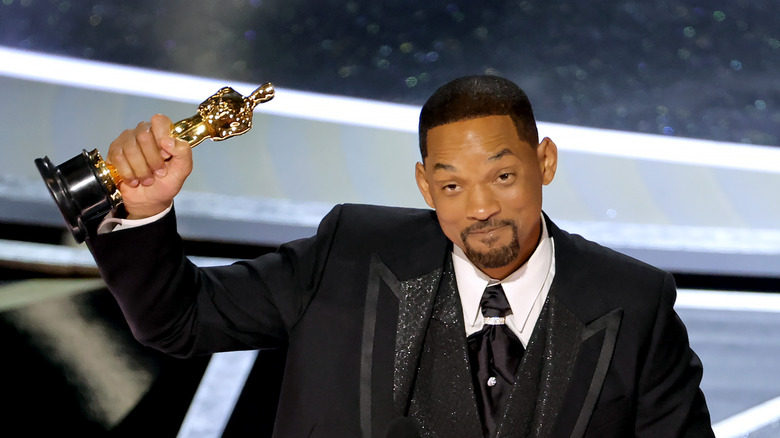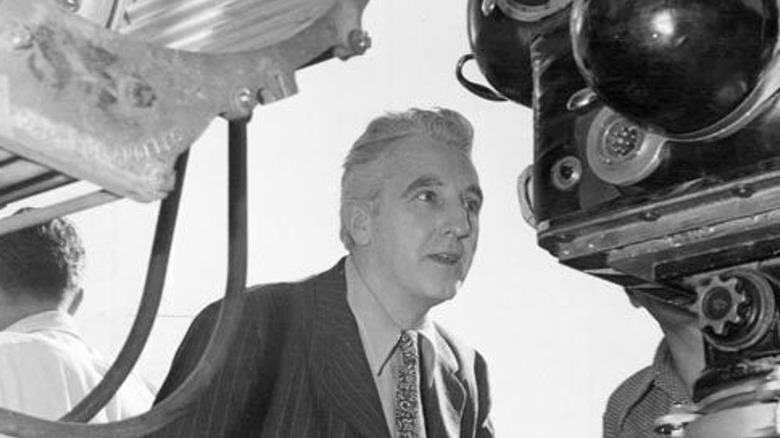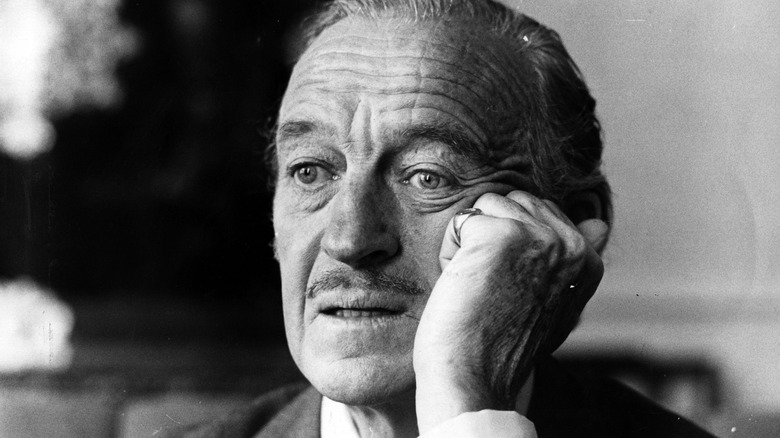The Oscars' Most Controversial Moments Of All Time
One evening each spring, the world's attention falls on Hollywood as the film industry's luminaries and rank-and-file meet to give each other trophies at the biggest plaudits-fest of them all, the Academy Awards. The golden statuettes handed out — but really the glory, validation, and clout that come with them — are so coveted that Oscar night is a stressful, nerve-wracking affair for everyone involved, particularly the nominees, presenters, and those putting on the globally broadcast live show.
With so much on the line and with so many possibilities for something to go off the rails, the show has frequently grown sidetracked or endured late-breaking controversy. When movie stars are set loose without a script and onto a stage where everyone is watching, anything can, does, and will happen. And so, every once in a while, the Academy Awards are a springboard for outright scandal, with some famous person acting or speaking out in an audacious and unforgettable manner. Here are the most jaw-dropping moments from nearly a century's history of Oscar ceremonies.
A 1930s screenwriter refused his Oscar as a protest
Winning an Academy Award is a rare accomplishment, and a life goal of many people who devote their professional lives to film. But it's not necessarily a big deal for those who have won and refused Oscars. It's always newsworthy and scandalous when such an incident transpires, and it certainly was the first time it happened.
At the Eighth Annual Academy Awards in 1936, the Oscar for Best Writing (Screenplay) went to Dudley Nichols for "The Informer," for his script based on Liam O'Flaherty's novel set during the Irish Civil War. Nichols was one of the most politically powerful writers in Hollywood: In 1920, he'd helped create the Screen Writers Guild (SWG), the first film industry labor union for writers before the creation of the Writers Guild of America, and he acted as its president for two years.
At the time of Nichols' win, the SWG was fighting for reasonable and fair labor practices within the Hollywood studio system. When his name was called out at the ceremony, held at the Biltmore Hotel in Los Angeles, Nichols took the stage to reject his Oscar. "To accept it would be to turn my back on nearly 1,000 members of the Screen Writers Guild," he said (per Collider).
Marlon Brando sent an intermediary to accept his Oscar
"The Godfather" received 10 nominations for the 45th Academy Awards, and it wasn't much of a surprise when Marlon Brando won Best Actor. However, he arranged for Sacheen Littlefeather, president of the National Native American Affirmative Image Committee, to turn down the statuette in his stead.
Littlefeather explained that Brando had prepared a "very long" statement that she'd share with reporters as to why the actor couldn't claim his statuette. "And the reasons for this being are the treatment of American Indians today by the film industry," Littlefeather said to a mixture of boos and applause, "and on television, in movie reruns." Littlefeather added, "I beg at this time that I have not intruded upon this evening and that we will in the future, our hearts and our understandings will meet with love and generosity."
The backlash was quick and vicious. After Littlefeather left the stage, John Wayne, star of the kind of movies Brando protested, tried to physically accost the advocate but was stopped by security. When western star Clint Eastwood presented an Oscar a few moments later, he commented (according to The Guardian), "I don't know if I should present this award on behalf of all the cowboys shot in all the John Ford westerns over the years." In the media in the weeks after, rumors suggested that Littlefeather was everything from an actor to a sex worker.
A streaker derailed the 1974 Academy Awards
Public nudity isn't just controversial and shocking to many, it's also very often illegal. American broadcast networks can't show the private parts of an unclothed male without incurring fines from the Federal Communications Commission, and likely fielding many letters of complaint from viewers. But a man named Robert Opel purposely cast all those considerations aside when he ran nude on stage, during the NBC-aired Academy Awards ceremony in 1974.
Streaking, an audacious early 1970s fad in which people ran nude through occupied public places as a form of social disobedience, peaked just after esteemed actor David Niven took the stage to give out the Oscar for Best Picture. As he monologued, the naked (except for a watch and mustache) Opel ran behind him and held up a peace sign with two fingers. After the crowd's surprised gasps and nervous laughter died down, a quick-thinking Niven quipped, "Isn't it fascinating to think that probably the only laugh that man will ever get in his life is by stripping off his clothes and showing his shortcomings?"
Vanessa Redgrave went political
"Julia" was nominated in 11 categories at the 1978 Academy Awards, and it won in three, including Best Supporting Actress, for Vanessa Redgrave. The film concerned two women who stood up to the fascistic, anti-Semitic Nazi movement before World War II, and Redgrave spoke to that early in her acceptance speech.
"We believed and we believe in what we were expressing, two out of millions who gave their lives and were prepared to sacrifice everything in the fight against fascist and racist Nazi Germany," she said. Applause turned into loud, angry boos when Redgrave addressed the controversy over her work in a documentary with a pro-Palestine, anti-Israel stance. "You've refused to be intimidated by the threats of a small bunch of Zionist hoodlums," she said, referring to extremists who had violently opposed her involvement with the documentary. Indeed, before the show, a group from the Jewish Defense League burned an effigy of the actor outside the Oscars venue.
Regardless of her specific intentions, the message was not well received. Later in the show, when screenwriter Paddy Chayefsky presented an award, he commented (via The New York Times), "I would like to suggest to Miss Redgrave that her winning an Academy Award is not a pivotal moment in history, does not require a proclamation and a simple 'Thank you' would've sufficed."
Snow White opened the Oscars and ended careers
The 1989 Academy Awards ceremony opened suddenly and cold, with gossip columnist Army Archerd standing outside the theater and fawning over the arrival of "one of the great legends of Hollywood, Miss Snow White!" Eileen Bowman, in her first screen credit, portrayed the squeaky-voiced, Disney version of Snow White as manically anxious and starstruck. She ran down the aisles of the venue, approaching uninterested seated movie stars while she sang "We Only Have Stars for You," a Hollywood-centric parody of "I Only Have Eyes for You."
Then Bowman disappeared while talk show host Merv Griffin took the stage to sing his 1950 hit "I've Got a Lovely Bunch of Coconuts" in a nostalgic nightclub tableau, surrounded by the oldest still-living Hollywood stars of yesteryear. Bowman came back to frenetically dance until Griffin introduced her to her date: Rob Lowe. He and Bowman together sang another movies-oriented parody, this one a take on "Proud Mary."
The sequence went on for 11 minutes. It was such an over-the-top, disjointed, and ill-received disaster that Bowman quit acting for a while and moved out of Hollywood the next day. Allan Carr, the producer in charge of the number, didn't work in the film industry again for nine years. And Disney sued the Academy for the unauthorized use of its take on Snow White.
Angelina Jolie had lots of love for her brother
A rising star throughout the late 1990s, Angelina Jolie's celebrity status was cemented when she was nominated for Best Supporting Actress at the 2000 Academy Awards, for her role as an institutionalized young woman in "Girl, Interrupted." The odds-on favorite to win, photographers awaited Jolie's arrival at the Oscars ceremony, and she made a memorable and notable impression, showing up with her brother, actor James Haven, as her date. Raising eyebrows as she blurred the lines between styles of love, the affectionate siblings mouth-kissed each other on the Oscars red carpet.
When Jolie won the Academy Award as expected, early in the ceremony, she tearfully embraced and once again deeply kissed Haven. Then she took the stage and made sure to place her Haven first and foremost in her acceptance speech. "I'm in shock and I'm so in love with my brother right now," Jolie said. After thanking others responsible for her success, she turned the conversation back to her brother. "Jamie, I have nothing without you, you're the strongest, most amazing man I've ever known, and I love you."
Adrien Brody assaulted Halle Berry
When Adrien Brody won the Academy Award for Best Actor at the 2003 ceremony, his victory represented the coronation of a new star. For his role in the based-on-a-true-story World War II drama "The Pianist," Brody defeated four iconic, Oscar-winning actors: Nicolas Cage, Michael Caine, Daniel Day-Lewis, and Jack Nicholson. Overwhelmed with emotion as he realized he'd won, and with the standing ovation he received, Brody ran to the stage to accept his Oscar from presenter (and 2002 Best Actress winner) Halle Berry. Rather than just accept his statuette, he swiftly enveloped Berry in his arms and bombarded her with a deep, lengthy, and unasked-for kiss.
The in-person audience reacted with surprise and delight to the kiss, which, technically speaking, was an act of sexual assault. "That was not planned. I knew nothing about it," Berry later said on "Watch What Happens Live." "I was like, 'What the f*** is happening right now?' That was what was going through my mind. And because I was there the year before, I know the feeling of being out of your body, I just f****** went with it." For his part, Brody told Vanity Fair that his action was "Probably one of the most memorable moments ever."
Michael Moore's politics weren't welcome
Hollywood is supposedly a place where progressive values and political opinions are the norm. Some may consider that this helped satirical filmmaker Michael Moore win the Academy Award for Best Documentary Feature in 2003, for "Bowling for Columbine," a hard-hitting piece about American gun culture. But judging by his acceptance speech, mainstream Hollywood wasn't completely on board with Moore's film, or his political views.
Moore brought all of his fellow nominees onto the stage with him, not necessarily to show appreciation but to make a point. "We like nonfiction, and we live in fictitious times," Moore said in his acceptance speech. "We live in the time where we have fictitious election results that elects a fictitious president," he added, referring to the contested 2000 election in which President George W. Bush was installed through a Supreme Court ruling, after losing the popular vote to Al Gore. And that's when the very aggressive booing began, nearly drowning out the mic-ed Moore. "We live in a time where we have a man sending us to war for fictitious reasons," Moore yelled, alluding to the 2003 invasion of Iraq by U.S.-led forces. "Shame on you, Mr. Bush," Moore finished, as the orchestra played louder to move him along.
Seth MacFarlane's hosting debacle
In 2013, Academy Awards producers went a different direction with its emcee, hiring not a stand-up comedian or seasoned TV host but rather Seth MacFarlane — standards singer, director, and occasional actor best known for creating and playing the main voice roles on "Family Guy" and "American Dad!" He brought the ribald, irreverent, and envelope-pushing humor that made him famous to the Oscars, opening the show with a high-concept musical number. William Shatner appeared on a big screen in character as Captain Kirk from "Star Trek," visiting from the future to warn MacFarlane that he was about to go down as the worst host the Oscars had ever seen.
The main reason: a Broadway-style song-and-dance sequence called "We Saw Your Boobs." In the unabashedly crude but also knowingly ironic number, MacFarlane (and the Gay Men's Chorus of Los Angeles) recounted the history of cinematic female nudity, listing off the women, many of whom were in attendance at the Oscars, who filmgoers have seen topless over the years. Along with Meryl Streep (in "Silkwood"), Angelina Jolie (in "Gia"), and Kate Winslet (a long list), MacFarlane mentioned Jodie Foster's unclothed appearance in "The Accused" — a film about sexual assault.
The wickedly embarrassing behavior of John Travolta
As attendees of the 2014 Academy Awards arrived at the Dolby Theatre, photographers captured John Travolta snuggling up to his "A Love Song for Bobby Long" costar Scarlett Johansson, wrapping his arm around her waist, pulling her very close, and giving her kisses. The photo of Travolta smooching an alarmed-looking Johansson went viral, leading the latter to tell reporters that the encounter had been widely misinterpreted. "The image that is circulating is an unfortunate still-frame from a live-action encounter that was very sweet and totally welcome," Johansson told the AP (via CBS News).
Hours later, Travolta overshadowed that weird moment with another. Tasked with presenting Idina Menzel's performance of Best Original Song nominee "Let It Go" (from "Frozen"), Travolta gushed over the star of Broadway's "Wicked," and then introduced her as "the wickedly talented Adele Dazeem." Travolta later explained that he'd messed up because, prior to going onstage, he'd been hypnotized by an encounter with Goldie Hawn. "I'm star-struck, hugging and loving her up, forgetting that I have to go and do this bit. And they said, 'You're on,'" Travolta said on "Jimmy Kimmel Live." Also, at that time, he was told to carefully read his remarks on the teleprompter, as Menzel's name had been written out phonetically. "It was the phonetic spelling, but I didn't rehearse it that way," Travolta said.
'La La Land' briefly and erroneously won Best Picture
Warren Beatty and Faye Dunaway presented Best Picture at the 2017 Academy Awards. Beatty opened the envelope bearing the name of the winner, read it, and seemed extremely confused. He stood there mostly frozen until Dunaway, conscious of the dead air and building tension, took the paper and read the name of the film listed: "La La Land." The producers of the movie musical, favored to win Best Picture, took the stage to give their speeches.
As they did, the confusion commenced. A crew member emerged with another envelope, explaining the situation to the "La La Land" cast and crew. Then one of the film's producers, Jordan Horowitz, took the microphone. "There's a mistake. 'Moonlight,' you guys won Best Picture," he announced. "This is not a joke." With the "La La Land" folks and the audience still confused, Horowitz grabbed the since-materialized correct Best Picture card and held it up for the cameras, declaring "Moonlight" the winner. As the correct recipients filed up to the stage, Beatty explained his actions (via USA Today). "I opened the envelope, and it said, 'Emma Stone, "La La Land."' That's why I took such a long look at Faye, and at you, I wasn't trying to be funny."
Brian Cullinan and Martha Ruiz, accountants from PricewaterhouseCoopers, responsible for watching over and handing winner envelopes to presenters, had goofed and given Beatty the Best Actress envelope. The accountants were barred from working the Oscars again.
Will Smith slapped Chris Rock
Two-time Academy Awards host and stand-up comic Chris Rock was afforded a few moments to joke and riff, before he presented the Best Documentary Feature prize at the 2022 Oscars ceremony. Looking into the audience, he spotted actor Jada Pinkett Smith, and noticing her bald head, commented, "'G.I. Jane 2', can't wait to see it," referring to the 1997 military drama in which Demi Moore played a shaved-headed sailor. Smith rolled her eyes while husband Will Smith (nominated that evening for Best Actor for "King Richard") laughed. Seconds later, however, Smith sauntered up on stage and slapped Rock hard across the face.
"Wow, Will Smith just smacked the s*** out of me," Rock said. Smith's reply from his seat: "Keep my wife's name out your f****** mouth!" Rock implored him to calm down; Smith repeated his assertion with more volume and anger. "That was the greatest night in the history of television," Rock said before getting the ceremony back on track.
It was such a bizarre and shocking occurrence that many TV viewers figured it was all a planned bit, as did Pinkett Smith at first. It wasn't. Minutes later, Smith won the Oscar and, during a tearful acceptance speech, justified the slap, noting, "Love will make you do crazy things." The Academy of Motion Picture Arts and Sciences later banned Smith from attending the Oscars and all related events for 10 years.


